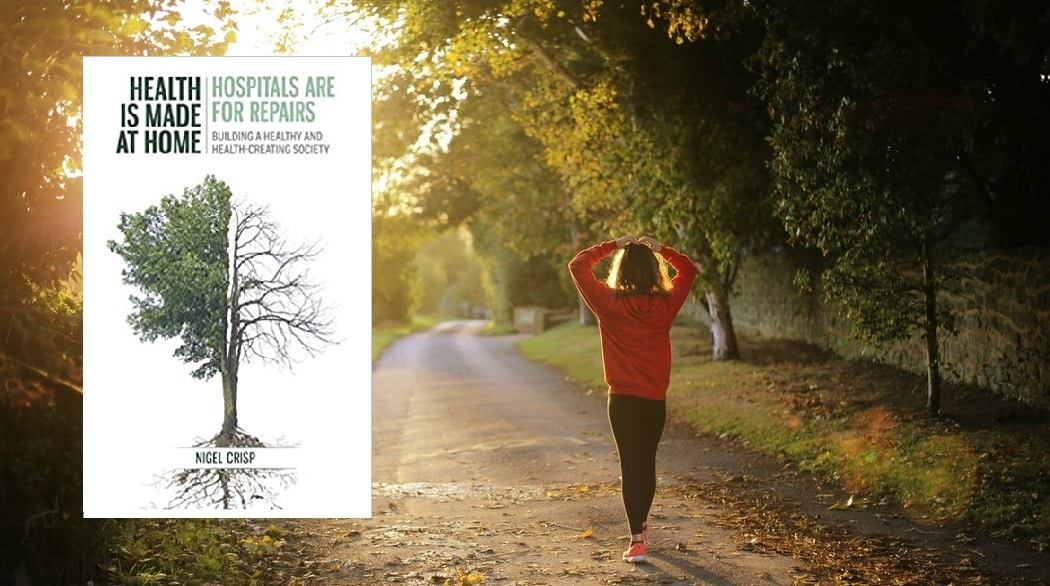Gillian Orrow is a GP at Smallfield Surgery and Community Development Lead, Healthy Horley PCN. She is on Twitter: @HuxleyG
Against the bleak backdrop of COVID-19, the murder of George Floyd and raging fires from the Amazon to the Arctic, Lord Nigel Crisp’s latest book provides that rarest of commodities for current times: hope. Health is made at home, hospitals are for repairs: building a healthy and health-creating society is a radical book from the former chief executive of the NHS. With a concept conceived in Africa, this book speaks to perennial ideas about health that have long been neglected by industrialised nations.
Who has been looking after health while we in the NHS have been tackling disease?
The book centres on an expansive and inclusive vision of health and care for both our NHS and our society. One where everyone has a role to play and where governments and the economic system itself have a responsibility to create the conditions for health. In setting out this new vision, the book addresses a critical question: who has been looking after health while we in the NHS have been tackling disease?
From my perspective as a GP I have observed a steadily increasing flow of ill-health over the last decade, arguably driven by a society that prioritises profit over people. I have also witnessed an unravelling of people’s confidence in their ability to manage their own health. I fear this may result from our tacit encouragement of dependency on the specialised healthcare system to ‘fix’ people, together with commercial messages that portray health as a purchasable commodity. With this toxic combination driving demand it is no surprise to see a rising workload take its toll on many colleagues, sacrificing their career, their mental health or in the worst case, their lives. And that was before COVID-19 arrived.
The recent ascendency of lifestyle medicine and social prescribing within general practice speak to our thirst to do things differently. But these approaches have their critics, who question whether they might widen health inequalities, erode the workforce and risk social iatrogenesis. And despite welcoming many aspects of these movements, I would add to these concerns: are they ceding enough power and control over health to patients and the community? Are they dismantling structural racism? Are they adequately reducing the ecological impacts of healthcare? And are they supporting communities in their transition towards the kind of low carbon future we urgently need if we are to avoid cataclysmic climate change? If we are truly aspiring to health then we need a compelling vision that addresses all of these issues. Perhaps “health creation” as defined in Lord Crisp’s book, could offer us this.
In Surrey I have enjoyed working with community partners both within and outside the NHS to try to put this vision into reality. Rather than “prescribing” or telling people what to do, we aspire to co-create the local conditions for the health of all to flourish. Examples include facilitating people’s desire to connect with nature and one another through a community food growing project and facilitating active travel, both to promote physical activity and reduce local air pollution.
We have a long way to go, but with adequate investment I believe it would be possible to improve the health capital of our population and reduce demand on the NHS. We could reduce the economic and ecological costs of healthcare while improving the working life of NHS employees. In conjunction with policy change from central government we could also help reduce the unacceptable health inequalities laid bare by COVID-19.
Lord Crisp’s new book provides a vision to steer us out of current difficulties.
Lord Crisp’s new book provides a vision to steer us out of current difficulties and I believe general practice is well placed to support its implementation. I would encourage colleagues to read and help refine these ideas from the primary care perspective, and even better, to collaborate with the “health creators” outside of the NHS who are already taking it forward. I hope to see many more leaders demonstrate the humility and compassion exemplified by Lord Crisp in Health is made at home, so that the quiet wisdom of individuals, communities and cultures might be heard, particularly those who have long been subjugated. We can then move away from systems of domination towards protecting, championing and amplifying such voices in pursuit of health and wellbeing for all.
Featured book: Crisp N, 2020. Health is made at home, hospitals are for repairs: Building a healthy and health-creating society. Pub: SALUS Global Knowledge Exchange. ISBN-13 : 978-1838031305
Featured photo by Emma Simpson on Unsplash






